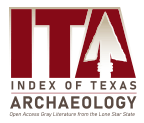Home > Research Projects and Centers > Center for Regional Heritage Research > Index of Texas Archaeology > Vol.
Article Title
Agency
Texas Historical Commission
Abstract
Raba Kistner Environmental, Inc. (RKEI), was contracted by the Bexar Heritage Program (CLIENT) to conduct archaeological investigations of two areas of Mission County Park in anticipation of the planting of 22 trees. The Mission County Park Tree Planting Project will be funded and managed by Bexar County, an entity of the State of Texas. As such, the project falls under the jurisdiction of Chapter 35 of the City of San Antonio Unified Development Code, as well as the Antiquities Code of Texas (Texas Natural Resource Code, Title 9, Chapter 191), by virtue of it representing a public undertaking.
The investigations included a background review and a pedestrian survey augmented by shovel testing. The background review revealed that two previously recorded sites were within the Area of Potential Effect (APE): 41BX1919 and 41BX1920. Site 41BX1919 was located in the northern portion of the APE and is listed as not eligible for listing in the NHRP. As such, shovel testing was placed in the area. Site 41BX1920 had previously been listed as eligible in the NHRP and was, therefore, avoided during survey. Antonio E. Padilla served as the Principal Investigator while Staff Archaeologist Chris Matthews conducted the field investigations on November 1, 2018. All work was conducted in accordance with the Archeological Survey Standards for Texas as set forth by the Council of Texas Archeologists and the Texas Historical Commission under Texas Antiquities Committee Permit Number 8301.
During the investigations it was observed that the majority of the APE had been impacted by construction and improvement activities along the existing sidewalk. Disturbances included grading of the soil on the western side of the APE, and the recent installation of five wooden poles. Thirteen shovel tests (CM1-CM13) were excavated within the APE, all of which were negative for cultural material with only one shovel test (CM8) having charcoal present in the soils. This shovel test was placed near the southern boundary of 41BX1920 and may show an extension of the previously recorded site.
RKEI made a good faith effort in identifying cultural resources within the APE. No significant cultural deposits or features were encountered during the intensive pedestrian survey; however, it is recommended that the existing boundaries of previously recorded site 41BX1920 be extended to include the southern boundary of the APE. RKEI recommends no further archaeological investigations for the current. Should changes be made to the extent of the project APE, further work may be required.
Creative Commons License

This work is licensed under a Creative Commons Attribution-NonCommercial 4.0 International License
Included in
American Material Culture Commons, Archaeological Anthropology Commons, Environmental Studies Commons, Other American Studies Commons, Other Arts and Humanities Commons, Other History of Art, Architecture, and Archaeology Commons, United States History Commons
Submission Location
Tell us how this article helped you.


